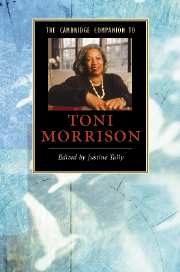9 - Toni Morrison’s social criticism
from Part II - Toni Morrison’s criticism and editing
Published online by Cambridge University Press: 28 January 2008
Summary
“But we do language.”
“Being a writer, she [the griot] thinks of language partly as a system, partly as a living thing over which one has control, but mostly as agency - as an act with consequences.”
(Toni Morrison, “Nobel Lecture” 13)“. . . lethal discourses of exclusion blocking access to cognition for both the excluder and the excluded.”
(Toni Morrison, “Nobel Lecture” 19)Though much less widely recognized or acclaimed than her fiction, or even her work in the field of literary theory, Toni Morrison's social criticism specifically elaborates on discussions raised elsewhere in her oeuvre. As in her other work, it contains a strong cognitive element, in the sense that she is primarily preoccupied with the way in which language is used by human beings and how it shapes what she calls the “construction of social reality.” Much of this is dealt with in her fiction, which is often fairly straightforward about the social conditions of African Americans, as, for example, in the episode in Song of Solomon, when in a “lecture” dominated by the word not, Railroad Tommy lists many of the things that a black person cannot have.
Nevertheless, Morrison's criticism goes beyond the mere representation of facts. Using the label “cognitive” can take much of the mystery out of the socalled “magic realism” of her work and place it in a context of pragmatics, of a discourse that connects language and the human beings who use it in a framework which puts at the center of intellectual activity embodied minds rather than some kind of textualist grammatology. Language is something that people “do”; it is a part of human behavior and therefore intrinsically of social relevance.
- Type
- Chapter
- Information
- The Cambridge Companion to Toni Morrison , pp. 125 - 138Publisher: Cambridge University PressPrint publication year: 2007

